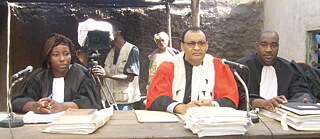Film Screening
Off to take Care: Programme 4 - Care Hypocrisy

Abderrahmane Sissako: Bamako | Djibril Diop Mambéty: Hyenas
What if the World Bank were put on trial? Would this be a first step out of the paralysis of what Mark Fisher called 'capitalist realism', the inability to imagine any alternatives to capitalism. Hyenas (1992) by Djibril Diop Mambéty, set Senegal, and Bamako (2006) by Abderrahmane Sissako, set in a residential area in the capital of Mali, both feature the World Bank as a duplicitous instrument of Neo Colonialism. Sissako uses a staging of voiced arguments to make the negative impact of international aid explicit, while Mambéty addresses its hypocrisy and the opportunism it causes more obliquely through an interplay of human behaviour, sound, and costume. The films are shown in chronologically reverse order so that the voices we hear in Bamako still echo in our ear as Linguère Ramatou, the old lady in Hyènes, fights her battle for justice. Curious to find out what this double feature can do while thinking around care on various scales.
We are pleased that Anjalika Sagar and Kodwo Eshun of The Otolith Collective will join us to introduce Hyènes .
2.00pm: Welcome + Introduction to the day and to Bamako
2.15pm: Bamako, Abderrahmane Sissako, Mali/France, 2006, 115 min
4.15pm: Introduction to Hyènes by Anjalika Sagar and Kodwo Eshun
4.30pm: Hyènes (Hyenas), Djibril Diop Mambéty, Senegal, 1992, 111 min
6.30pm: Discussion
7.00pm: Drinks, Nibbles and Conversations
Please scroll down for more information about the films.
We are pleased that throughout the festival, participants of the Waiting Times Project will share their responses and take part in our discussions about the films.
Funded by the Wellcome Trust, the Waiting Times Project opens up the relationship between time and care, exploring how lived experiences, representations and histories of delayed and impeded time shape and create experiences of care, including healthcare.
Please note that we do not show any adverts and the programme will start on time. Start times throughout the programme may slightly shift. All films that are not in English are shown with English subtitles. You need just one ticket for the whole programme.
Approaching curation as an artistic practice of building intergenerational and cross-cultural platforms, The Otolith Collective has been influential in critically introducing particular works of artists such as Chris Marker, Harun Farocki, Anand Patwardhan, Etel Adnan, Black Audio Film Collective, Sue Clayton, Mani Kaul, Peter Watkins, and Chimurenga in the UK, US, Europe, and Lebanon.
Bamako, Abderrahmane Sissako, Mali/France, 2006, 115 min
Fourteen years after Djibril Diop Mambéty's Hyènes, Sissako realised Bamako. With completely different aesthetic and narrative strategies, both films address similar concerns implicit in the question, "Can you imagine a world without the World Bank?" And after a short pause, the witness answers, "Absolutely!"
In the backyard of a residential neighbourhood in the capital of Mali, a court case is taking place. The defendants are the International Monetary Fund and the World Bank, for their careless financial policy of systematic indebtedness. Scaling up, from the backyard in Bamako to the abstract mechanisms of the capitalist system, the film works through efforts to grasp this network of relations verbally, through language, to give space to different ways of speaking, representations, insights. At the same time, the backyard serves as an interface between court proceedings, world politics and everyday care work – preparing meals, looking after children and the sick.
Hyènes (Hyenas), Djibril Diop Mambéty, Senegal, 1992, 111 min
Hyènes is created through detours. From Senegal via Switzerland, via cinema, via literature, via St Gallen back to the Senegalese town of Colobane. Watching Ingrid Bergmann as “old lady” in Berhard Wicki’s film The Visit had evoked a memory: Djibril Diop Mambéty was reminded of a mysteriously generous lady he had known as regular guest from a bar in Dakar, and who had disappeared without further notice and never returned. With Friedrich Dürrenmatt’s eponymous play he had found a story that even linked to the ending of this earlier film Touki Bouki. He came to visit the Swiss writer in St. Gallen and got his consent to shoot his own version of The Visit.
At its core, one could argue, Hyènes is about the hypocrisy of local and global care, played out within the microstructures of a village community, but with the world economy always in mind. An association, supported by the dystopian-sounding synthesiser melodies composed by Wasis Diop. Hyènes was to be the second part of a trilogy on power, money and madness. Caring and worrying are presented as a conglomerate of hypocritical gestures, always guided first and foremost by self interest. The Old Lady returns to Mambéty as the incarnation of the World Bank. Arriving at the station of Colobane, she gets off the train, all finery on the outside, but one hundred percent prosthetics on the inside. She has come back to expose the hypocrisy of the capitalist system, in which everyone supposedly has their share.
Details
Price: Price: £5, concession £3, free for Goethe-Institut language students and library members, booking essential.
+44 20 75964000
info-london@goethe.de
Part of series Off To Take Care